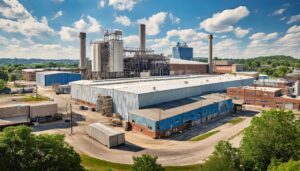- Geographic Advantage: Nashville’s strategic location enables companies to access over half of the U.S. population within a day’s drive, boosting its attractiveness to logistics, e-commerce, and retail sectors.
- Leasing Activity: Despite a slowdown from peak levels in 2021, Nashville’s leasing activity remains above pre-pandemic levels, indicating sustained interest and growth in the region.
- Development Surge: Developers are actively bringing high-quality, large-scale projects to Nashville, maintaining a steady pace of pre-leasing and keeping vacancy rates tight at 4.1%, comparable to infill markets like Los Angeles.
- Construction Boom: About 10.2 million square feet (SF) of industrial space is under construction, representing 3.8% of the existing market inventory, outpacing the national average growth rate.
- Historical Highs: Nashville’s industrial inventory will grow by approximately 10.5 million SF in 2023, breaking a 20-year record, with no previous year exceeding 9 million SF.
- Vacancy and Rent Growth: Nashville has seen strong rent growth nationally, with vacancies staying well below historical norms. However, recent gains have started to align more closely with pre-pandemic rates.
- Asking Rent Trends: After experiencing higher-than-normal increases, asking rent growth in Nashville has moderated to around 2.4% quarterly, remaining above pre-pandemic levels but below the peaks of 2021 and early 2022.
- Investment Slowdown: Elevated borrowing costs have led to a reduction in investment activity, with the last quarter showing the lowest investment levels in over five years and a significant drop from the mid-2022 highs.
- Shift in Market Dynamics: The market has seen fewer transactions involving larger-sized properties, with national and institutional investors becoming less active and smaller local transactions becoming more prevalent.
- Market Resilience: Despite the slowdown in some areas, Nashville’s industrial market continues to exhibit resilience and growth potential, supported by its strategic location and strong fundamentals.
Page Contents
- Nashville Industrial Leasing Activity
- Developer Response and Supply Growth
- Key Industrial Deals in Nashville
- Tight Market for Smaller Spaces
- Nashville’s Automotive Industry Impact
- Steady Vacancies and Landlord Pricing Power
- Rent Growth Trends
- Varied Asking Rents Across Nashville
- Leasing Dynamics in New and Older Buildings
- Flex Space Market and Future Rent Projections
- Surge in Industrial Development
- Pandemic-Driven Demand for Space
- Geographic Distribution of Industrial Space
- Development Focus and Upcoming Projects
- Pre-leasing and Market Trends
- Investment Slowdown Due to Rising Interest Rates
- Nashville’s Investment Appeal
- Shift in Market Transactions
- Notable Recent Transactions
- Leading Submarkets and Asset Sales
- Closing Thoughts
Nashville Industrial Leasing Activity
 Leasing activity in Nashville’s industrial sector has slowed since peaking in 2021 and early 2022. Approximately 2.5 million SF was leased by mid-2023. This matches pre-pandemic levels but is less than the over 4 million SF leased in previous years. Economic uncertainty is causing cautious expansion among retailers and distributors.
Leasing activity in Nashville’s industrial sector has slowed since peaking in 2021 and early 2022. Approximately 2.5 million SF was leased by mid-2023. This matches pre-pandemic levels but is less than the over 4 million SF leased in previous years. Economic uncertainty is causing cautious expansion among retailers and distributors.Developer Response and Supply Growth
Despite the slowdown in leasing, developers are actively adding to Nashville’s industrial space. Developers will add around 10.5 million SF in 2023, potentially increasing vacancies. However, the vacancy rate remains low at 4.1%, indicating a robust market.
Key Industrial Deals in Nashville
Significant leases in 2023 include Geodis acquiring over 633,400 SF in Wilson County and Walmart renewing 231,400 SF in La Vergne. Walmart’s expansion brings its total Nashville footprint to over 1.1 million SF, showcasing the region’s appeal to large corporations.
Tight Market for Smaller Spaces
In Nashville, industrial properties under 50,000 SF are scarce, with an availability rate below 2%. Larger properties have higher availability rates. The trend toward building larger spaces has limited growth in smaller property segments.
Nashville’s Automotive Industry Impact
Nashville’s role as an auto manufacturing hub boosts its industrial market. Major investments by GM and Nissan, along with new facilities by LG and Tritium, are expected to drive industrial demand in the area. These developments highlight Nashville’s importance in the automotive and electric vehicle sectors.
Steady Vacancies and Landlord Pricing Power
Nashville’s industrial market has seen a slowdown in leasing, yet vacancies remain low, allowing landlords pricing strength. Rent growth has been well above historical norms, reflecting the market’s resilience.
Rent Growth Trends
While current rent growth is high, experts predict it will decrease from the pandemic peaks. The average quarterly growth has slightly surpassed pre-pandemic rates, indicating a market normalization.
Varied Asking Rents Across Nashville
Asking rents in Nashville differ by location and property type, with higher rates in Downtown and for larger, newer spaces. This variance reflects the diverse industrial landscape of the metro area.
Leasing Dynamics in New and Older Buildings
Recent leases showcase the rent disparity between new and older properties. Newer constructions command higher rents, indicative of the market’s evolution and demand for modern space.
Flex Space Market and Future Rent Projections
Flex space in Nashville shows a premium in rent, particularly in urban areas. Despite committed developments, experts anticipate a
 slowdown in rent increases, adjusting to economic shifts and leasing trends.
slowdown in rent increases, adjusting to economic shifts and leasing trends.Surge in Industrial Development
Nashville has seen a dramatic increase in industrial construction, consistently surpassing previous records since mid-2020. The city’s industrial space expansion reflects its economic and population growth.
Pandemic-Driven Demand for Space
The pandemic accelerated demand for warehouse and distribution space in Nashville, boosting construction activity. This trend follows population and economic gains in the region, highlighting its growing market appeal.
Geographic Distribution of Industrial Space
Lower land costs and infrastructure drive the concentration of industrial space in Nashville’s Wilson and Rutherford Counties. The majority of recent industrial developments are located in these areas, underscoring their strategic importance.
Development Focus and Upcoming Projects
Significant developments include Prologis’s 840,300-SF project in Southeast Nashville, with expected completion soon. This area remains a focal point for new industrial projects, reflecting its market vitality.
Pre-leasing and Market Trends
While less than two-thirds of Nashville’s industrial space is pre-leased, this aligns with historical norms, indicating steady market activity. The pre-leasing rate has slightly increased post-2020, suggesting a stable industrial market in Nashville.
Investment Slowdown Due to Rising Interest Rates
Nashville’s industrial investment has cooled, with deals dropping significantly due to higher interest rates. This decline mirrors broader market trends and indicates a cautious investor approach.
Nashville’s Investment Appeal
Despite the slowdown, Nashville’s industrial market has historically attracted investors, buoyed by demographic growth and strategic location. This has fueled demand for distribution centers, driving investment highs.
Shift in Market Transactions
Recent market activity shows a decrease in large asset sales, with a notable shift from national to local buyers. This change reflects a more cautious investment environment and a focus on smaller properties.
Notable Recent Transactions
A significant sale occurred when GTIS Partners acquired a property in Mt. Juliet, marking a shift in market dynamics. This transaction ended a period of inactivity in larger asset transfers, highlighting ongoing interest in quality industrial spaces.
Leading Submarkets and Asset Sales
Wilson County and Southeast Nashville have historically been hotspots for transactions, attracting national tenants and high sales volumes. Recent sales, like Park 109, indicate the area’s continued market importance.
Closing Thoughts
Nashville’s industrial market reflects dynamic growth and shifting investment trends, balancing strong historical appeal with current economic challenges. While larger transactions have slowed, the market’s strategic position and robust development pipeline continue to attract attention. For tailored investment strategies in this evolving landscape, contact Lumicre. Their expertise can guide your industrial investment decisions in Nashville.